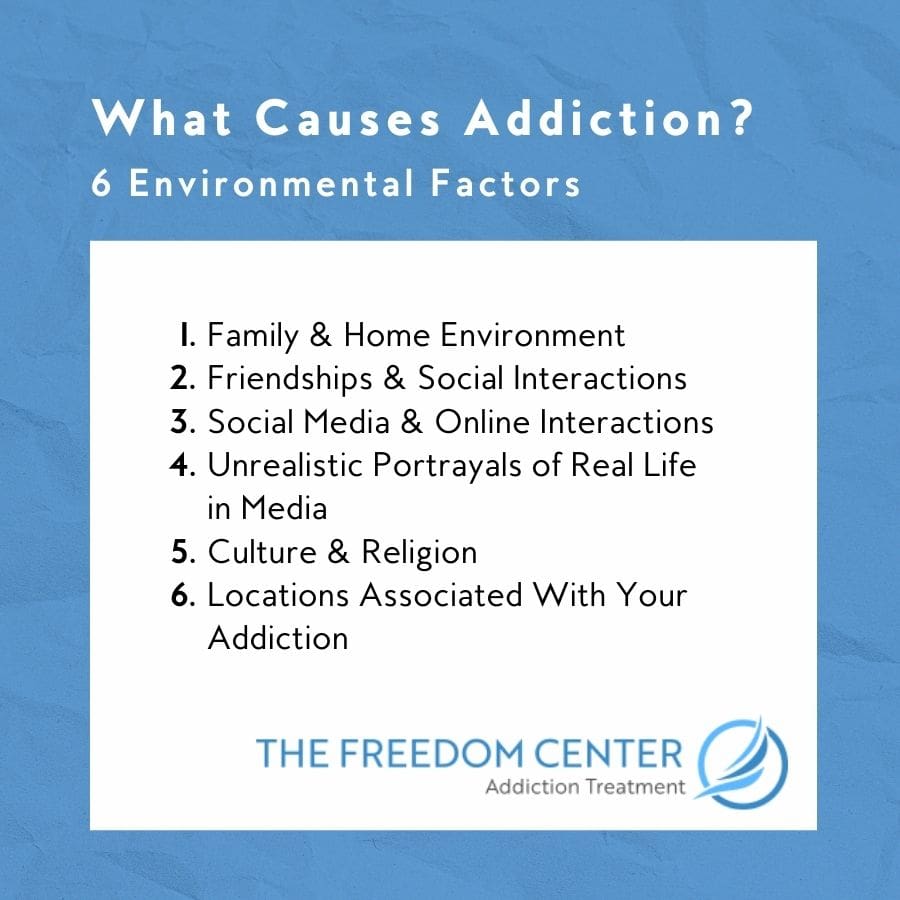There is an abundance of possible reasons why one person may develop an addiction and another person wouldn’t. Addiction may seem like it comes out of nowhere, but there is usually a cause or reason behind its development. The root cause of addiction can vary depending on the person and their circumstances. Read on to learn more about the possible causes of drug or alcohol addiction to understand this disease better.
The Most Common Causes of Addiction
Addiction is a complex condition that affects a person’s behavior and brain. And while the phrase “addiction” often conjures images of drug abuse and alcoholism, it’s important to remember that addiction can take many forms. From gambling to sex to social media use, addiction can cause harm in several ways.
But what causes someone to become an addict? What makes one person more likely than another to develop an addiction problem? The answer is complicated, and there are no simple explanations for why some people become addicts while others do not.
However, research has identified several potential factors that may contribute to addiction.
1. Genetics
Genes can play a significant role in the onset of addiction as some people have a genetic predisposition to addiction. People with a first-degree relative (parent, children, sibling) with addiction may have an increased risk of developing an addiction.
Although there isn’t a definitive causal relationship between addiction and genetics, research has found some interesting links. For example, cannabis use disorder has a genetic component, smoking and alcohol abuse. While there’s still a lot more to learn about the connection between genes and substance use disorder, it’s one of the most common root causes of addiction.

2. Environmental Factors
Environmental factors are also a contributing factor, such as being raised in poverty or experiencing an abusive childhood. Other environmental factors that may affect the onset of substance use include peer pressure, unstable home environment, parents that use drugs, presence of drugs at home, and community influence.
Although environmental factors are a high risk for substance use disorders, they can be minimized. Children who grow up with solid family pillars, positive relationships, and a sense of community can develop the self-control needed to protect themselves from some of the risk factors of developing an addiction.
3. Trauma
Childhood experiences may significantly impact a person’s physical and mental health. Traumatic childhood experiences may lead to emotional difficulties such as substance abuse. Examples of traumatic experiences include:
- Physical and/or sexual abuse
- Verbal abuse
- Emotional neglect
- Witnessing violence
- Parental separation or divorce
- Stress-related to military-family life
In addition, traumatic brain injuries can cause change within the brain that results in an increased risk of addiction and other symptoms like headaches, memory loss, and sleep problems.
4. Underlying Mental Health Disorders
A mental health disorder can come with feelings of stress and anxiety, which increases the risk of addiction. About 50% of people with a substance use disorder also struggle with mental health problems. Individuals with untreated mental health disorders may turn to drugs or alcohol to self-medicate to cope with their symptoms. Those with anxiety, depression, or bipolar disorders are twice as likely to have a substance use disorder.
5. Brain Changes
Physical addiction occurs when the repeated use of an addictive substance changes the way the brain feels pleasure. For many experts, the root cause of addiction refers to brain changes. Addictive substances can cause physical changes that reduce dopamine production and inhibit the brain’s ability to feel pleasure naturally. When this happens, someone who abuses drugs feels they can only operate properly under the influence of drugs or alcohol.
Other Risk Factors to Consider
Addiction is a complex disease that affects people of any age, sex, or economic status. Besides the common causes of addiction, it’s important to understand the factors that may also affect the speed of developing an addiction:
- Early use. Using drugs at an early age can cause permanent changes in the developing brain that significantly increase the risk of developing an addiction.
- Using highly addictive drugs. Some drugs, such as opioids, cocaine, or stimulants, result in faster addiction development than other drugs. This is because these drugs produce intense withdrawal symptoms and quickly rewire the brain’s structure and change its dopamine receptors.
- Poor support system. Many people who become addicted to drugs or alcohol may have strained relationships with friends and family. A poor support system may turn people to go for addictive substances as a mechanism to cope with feelings of loneliness or depression.
Finding Help for Addiction
While there are many causes of addiction, it’s essential to seek help when you realize you or a loved one is struggling with substance abuse. Attending substance abuse treatment is the best and most effective way of treating addiction and finding long-lasting recovery.
Sources:
https://www.drugabuse.gov/sites/default/files/soa_2014.pdf
https://www.psychiatry.org/patients-families/addiction/what-is-addiction
https://www.drugabuse.gov/publications/drugfacts/genetics-epigenetics-addiction











































